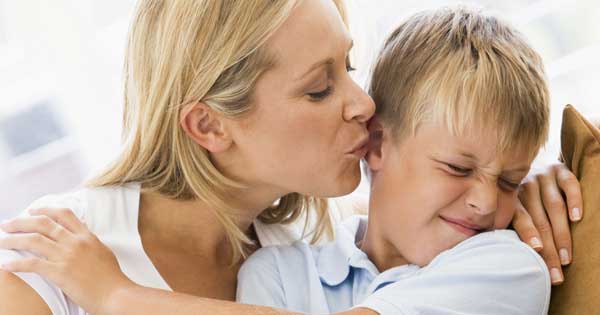Parents embarrassing their kids is as much a part of parenting as changing nappies or telling them off.
But while the fact that mums and dads embarrass their children – and quite possibly enjoy it – hasn’t changed, it seems they’re doing it in a much more modern way.
A new study has found that the primary route to embarrassment at the hands of parents is the internet, with three quarters of the mortifying things kids say their parents do taking place online.
The research by Post Office Broadband revealed today’s teens are suffering social media mortification at the hands of their parents, with more than three quarters (78%) of youngsters claiming they are constantly left red-faced because of their parents’ actions on sites like Facebook, Instagram and Twitter.
Indeed, more than one in 10 (14%) say they feel more embarrassed by their parents being online than in real life.
Baby picture no-no
The report found that more parents are online than ever before, with almost three quarters (70%) of parents and 38% of grandparents using sites such as Facebook to keep up with teenagers’ social lives.
As a result, online offences dominate the top 10 list of embarrassing things parents do. Complaints from teenagers include parents posting old family pictures online (31%) and embarrassing comments being left for all to see (28%).
Despite the objections, nearly a third of parents admit they frequently post baby pictures of their teens.
Vicki Shotbolt, chief executive of the parenting site Parentzone, points out there’s a big difference between sharing baby photos and special moments and posting obviously embarrassing snaps online.
“Make sure you’re sharing with the people you want to share with by using privacy settings,” she advises.
“And if you’re going to publish a photo to the world, make sure it’s one you (and your child) would be happy seeing on a billboard now or at any time in the future.”
Facebook friends
A fifth of parents say they often add their children’s school friends as Facebook friends, despite 17% of teens protesting that this mortifies them.
Possibly as a result of mums and dads ‘stealing’ teens’ Facebook friends, and sharing content inappropriately, one in 10 teenagers admit they hide online posts from family members.
However, some of their parents just don’t get it – and in fact 14% believe their offspring think they’re cooler for using social media.
That said, it’s not just about your kids thinking you’re cool, as a savvy 17% of parents admit they follow their children online just to keep tabs on them.
While many parental misdemeanours occur online, that doesn’t mean kids aren’t embarrassed by their mums and dads in traditional ways too. Old-fashioned family faux pas include parents being badly dressed (22%) or having to be seen in public together (21%).
And even waiting in sight when teens are being picked up from school/parties, as opposed to staying in the shadows or round a corner, is a source of embarrassment for an ungrateful 22% of youngsters.
Eternal truth
“Parents embarrassing their children is an eternal truth,” admits Shotbolt.
“It has always happened and always will. However, there’s something very different about causing public distress to children and building a digital footprint of them that causes them upset.”
She explains that parents who purposely post embarrassing content online are undermining important messages about being kind online and thoughtful about what’s shared.
“It lessens the fundamental trust that children need to have in their parents,” she says.
“If a child can’t trust their parent to protect and respect their privacy online, who can they trust?
“Knowing your parents are on your side and empathetic to your feelings is extremely important to children’s wellbeing. Careless public embarrassment from someone as close as a parent can be more hurtful than many parents realise and run counter to many crucially important safeguarding messages.”
Top 10 ways teens are left red-faced by parents
1. Posting childhood pictures on social media (31%)
2. Posting embarrassing comments online (28%)
3. Waiting in sight when being picked up from school/parties (22%)
4. Embarrassing dress sense (22%)
5. Being caught in public together (21%)
6. Excessively liking all social media posts (20%)
7. Posting holiday pictures on social media (17%)
8. Tagging in cringey status updates (14%)
9. Following/adding school friends (17%)
10. Posting private messages publically (6%)
